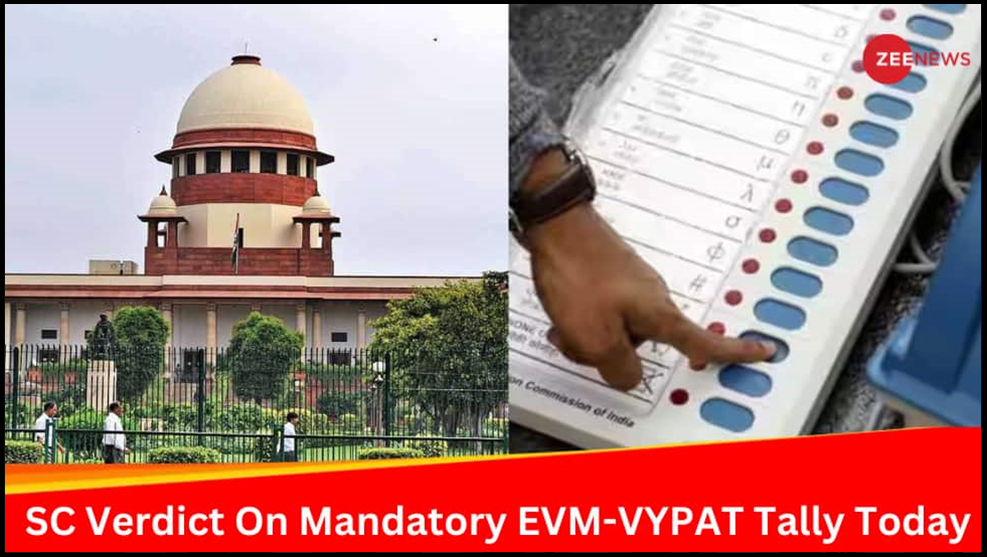SC AFFIRMS CREDIBILITY OF VOTING MACHINE
Syllabus:
- GS 2: Separation of powers between various organs dispute redressal mechanisms and institutions.
Focus:
- The Supreme Court of India has issued a notice to the Election Commission (EC) in response to a writ petition filed. The petition seeks a directive to mandatorily cross-verify the count in Electronic Voting Machines (EVMs) with votes recorded in Voter Verifiable Paper Audit Trail (VVPAT) slips.
Source: ZeeNews
In a pivotal verdict, the Supreme Court of India has reinforced the credibility of Electronic Voting Machines (EVMs), decisively dismissing all pleas for reverting to paper ballots and extensive verification of Voter Verifiable Paper Audit Trail (VVPAT) slips.
Supreme Court’s Decision on EVMs
- Affirmed Credibility: The Supreme Court confirmed the reliability of Electronic Voting Machines (EVMs), dismissing demands for 100% verification of Voter Verifiable Paper Audit Trail (VVPAT) slips.
- Technical Review: A thorough review of the EVMs’ administrative and technical safeguards was conducted, confirming their security and user-friendliness.
- VPAT Validation: It was decided that the current method of counting VVPAT slips from five randomly selected constituencies suffices to uphold vote verifiability.
- Rejection of Paper Ballots: The Court opposed returning to paper ballots, highlighting issues like booth capturing which EVMs eliminate by limiting the rate of voting.
- Preservation of Integrity: The decision reinforces the integrity of the voting process against baseless criticisms aimed at undermining electoral transparency.
Overview of case
Legal Implications:
|
Opposition’s Critique of EVMs
- Inconsistent Allegations: The opposition’s narrative against EVMs fluctuates based on their electoral success, lacking consistency and evidence.
- Historical Context: Instances like the Congress party’s acceptance of EVMs during their wins in 2004 and 2009 versus their criticism post-2014 when their fortunes declined.
- Claims of Manipulation: Allegations by figures like Digvijaya Singh that EVMs could be hacked, contradicted by subsequent electoral successes in state elections.
- Selective Skepticism: The pattern of skepticism appears strategically aimed at undermining public trust in the electoral process to cover political failures.
- Future Anticipations: The opposition seems to be prepping for potential defeat in upcoming elections by continuing to question the credibility of EVMs.
Implications for Electoral Trust
- Strengthening Democracy: The Supreme Court’s affirmation of EVMs with VVPATs supports a tamper-proof voting method, enhancing democratic trust.
- Political Dynamics: The critique of EVMs often reflects underlying political strategies rather than factual issues with the voting machines.
- Judicial Independence: The need for the opposition to stop using the judiciary for political gains, as seen in attempts to litigate electoral tools.
- Electoral Transparency: Continued use of EVMs signifies a commitment to conducting transparent and fair elections in India.
- Public Confidence: The judicial support for EVMs should bolster public confidence in the electoral outcomes, deterring baseless skepticism.
The Supreme Court’s judgment stands as a robust defense of EVMs, ensuring the integrity of India’s electoral process and thwarting baseless opposition claims that could undermine democracy and public trust in the electoral outcomes.
What is VVPAT?
Functionality:
Related Supreme Court Ruling:
|
Source:Indian Express
Mains Practice Question:
Evaluate the role of the judiciary in maintaining the integrity of electoral processes in India. Discuss the recent Supreme Court decision regarding the use of Electronic Voting Machines (EVMs) and its implications for electoral transparency and trust. (250 words)
Associated Articles:
https://universalinstitutions.com/supreme-court-to-address-vvpat-verification-pleas-on-april-16/




